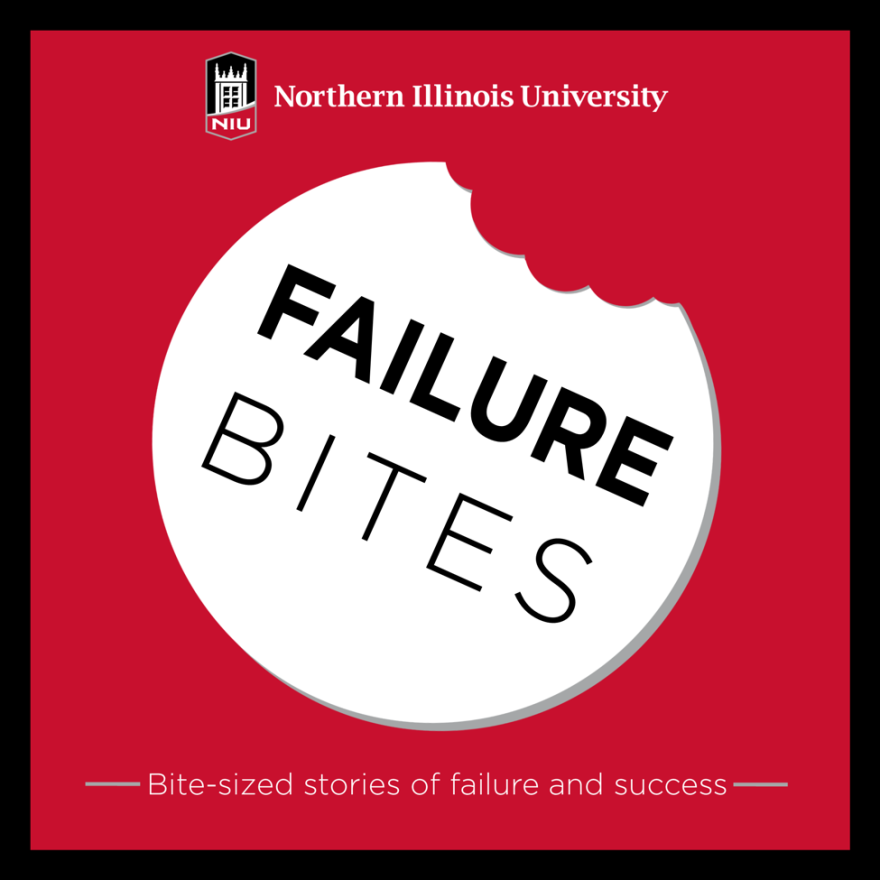S01E04: I Get Knocked Down – Tom Gustafson
When making a feature length film, there are so very many things that can go wrong. Tom Gustafson explains how he got things to go right.
Follow NIU STEAM on Twitter: twitter.com/niusteam
Facebook: www.facebook.com/NIUSTEAM/
KB: You are listening to the Failure Bites podcast, where successful people tell bite-size stories about failure, growth, and success. I’m your host Kristin Brynteson. There’s a song from the late 90s that has become my personal failure anthem. It reminds me that when I get knocked down, I need to get back up again—never let it keep me down! Nothing can be more frustrating than dealing with small failures, roadblocks, and set-backs that keep us from our goals. We have to just keep getting up again, no matter how many times we get knocked down. On this episode, we hear from director and producer Tom Gustafson about overcoming roadblocks and rejections and having the resilience to keep going. He is an award-winning filmmaker best known for musical features such as Were the World Mineand Mariachi Gringo.
TG: Creating film projects is a very long series of rejections, failures, and success. Y’know, the process of making a film has many different stages, from the writing to the physical production, finding the money, finding investors, the actual physical shoot, going out and casting it, and then, post-production, editing, and ultimately, hopefully, distribution. And along the way of that whole process, you’re constantly rejected, constantly failing, and then hopefully having some successes along the way. For example, like casting, for the last film that we did, it’s a very challenging thing to get especially established, well-known actors into a project—an independent film project.
So, you’re constantly getting rejected, and it would be very easy to just kind of give up and take your things and go away. But you have to stay kind of focused and motivated in moving the project ahead. And it may not be exactly what you thought it was in the beginning, or what you imagined the project to be, but you have to kind of go with the changing process, if that makes sense. Yeah, and I think for our first film that we made, which was called Were the World Mine, when we were first kind of going out looking for investors and looking for production companies, a lot of people said that it was this or too that. It was too gay or too musical or why would anyone want to hear a story about a bullied gay kid—isn’t that passé now? And we knew in our hearts that we wanted to tell this story and that we were going to do anything to make it happen. And so, we kept having kind of to use that rejection and use those nos and failures to kind of motivate us to make it happen no matter what. And luckily, we found other people that believed in it and came onboard to push it forward. And then, once production was done, which is a challenge, then you have to go and sell the movie. For every filmmaker, that’s a… failure is such a tricky thing because there’s so many different aspects of what makes a film successful, whether it’s commercial, financial success or critical success or just kind of artistic success. And I think never at least in my brain will I ever feel completely successful because there’s always elements that I could have done better or I know that critics come back and you get a bad review—like, you take it personally, but you can’t. That’s a really terrible thing to do. You have to just kind of know that you made the best project that you could make at that time.
KB: You just heard Tom Gustafson talk about how the small setbacks inherent in the filmmaking industry gave him the motivation to keep moving forward. A failure can also be seen as a success—it all depends on how you define it. Sometimes, what we feel is a failure is really the best you could do at that time. It does not mean it’s the best you can do period. With Tom, I’ve seen this firsthand as his big sister. I’m Kristin Brynteson, and this was Failure Bites. Leave a review and subscribe for more. If you can’t do it this time, that doesn’t mean you can’t do it next time. This podcast was produced by NIU STEAM at Northern Illinois University. Your future, our focus.





